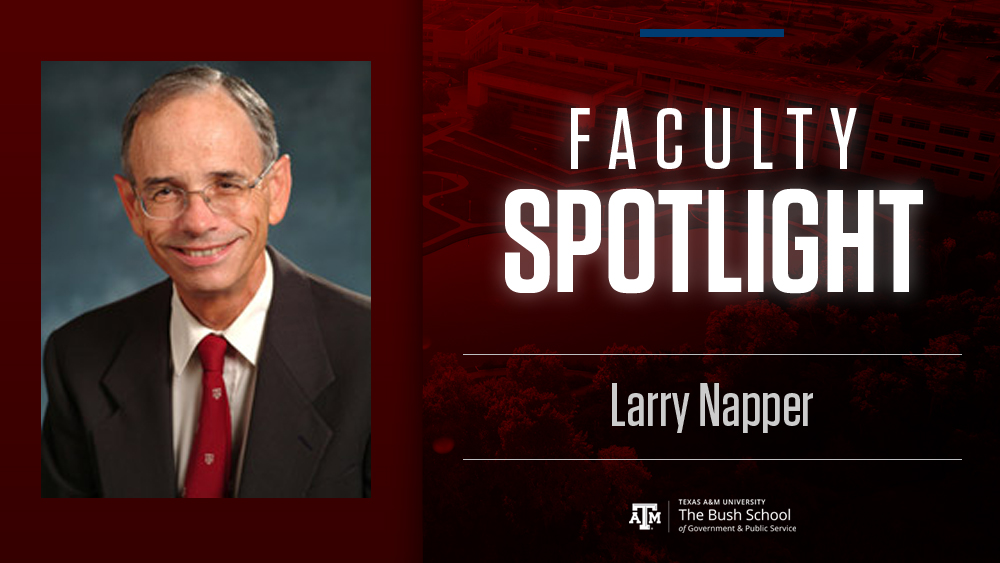
By Miranda Russ
When Professor Larry Napper first arrived at Texas A&M University to study history, he had only read about the vast world outside of the United States – but had never seen any of it. That would soon change in ways he never imagined. After graduating from Texas A&M as a member of the Corps of Cadets, Company D-2, Professor Napper joined the United States Army, where he had his first opportunity to gain an international perspective while rising to the rank of captain.
“I had always been interested in international affairs, and I enjoyed reading about the world at large,” said Napper. “My first opportunity in public service was as a member of the Army, and the traveling I did reinforced my desire to have a career that spanned national boundaries.”
Upon leaving the Army, Professor Napper received a Master’s in Government and Foreign Affairs from the University of Virginia. His next step was to apply for the Foreign Service in 1974, which eventually led to a 31-year career as a United States diplomat. His first assignment in the Foreign Service was in Moscow in 1975, followed by an assignment in Botswana for two years, after which he returned to Moscow in 1984. One of his most memorable assignments was in Bucharest, Romania, from 1989 through 1991, where he witnessed history firsthand with the collapse of the Soviet Union.
“It was an incredibly interesting and exciting experience to be living there at that time. The collapse of the Soviet Union was a monumental event,” said Napper. “No one knew whether this event would occur peacefully or if there would be considerable violence attached to it.”
With the emergence of many new states overnight, there was an enormous set of tasks to perform in order to establish embassies and avoid an outbreak of violence.
“President George H.W. Bush did a masterful job in managing that transition,” said Napper. “Within ninety days, we had established embassies in fifteen new countries without any significant violence,” he added.
Professor Napper’s hard work and effectiveness as a Foreign Service officer was recognized when, in 1995, he was appointed as the ambassador to Latvia, one of the newly independent states, followed by an appointment as the ambassador of Kazakhstan from 2001 to 2004.
Professor Napper returned stateside in 2005 as a diplomat-in-residence at the University of Houston, where he was a recruiter for the Foreign Service. Soon after, he was asked to share his knowledge by training future public servants as a senior lecturer at the Bush School of Government and Public Service. As a second-generation Aggie, Professor Napper was thrilled to return to Texas A&M and be a part of the Bush School.
“The Bush School is doing a fantastic job of preparing students for careers in public service,” said Napper. “It is competitive with some of the best schools in the country in terms of its academic excellence and affordable cost of education. The federal workforce is aging and getting ready to retire, and there is a need to replace them with a new generation of public servants. I’m happy to be able to help with that.”
With his background, he is able to provide students a unique perspective from both an academic and practitioner standpoint. His students take part in international relations simulations, where they apply the theory they have learned. He is also the director of the Scowcroft Institute of International Affairs, the primary research arm of the Master’s Program in International Affairs, which brings numerous speakers each semester to share their experiences in international affairs with students and the community.
When Professor Napper is not teaching courses in foreign policy and former Soviet Union politics or bringing in world-renowned speakers through the Scowcroft Institute, he enjoys attending Texas A&M sporting events, particularly football and basketball. He encourages any student interested in public service and international affairs to consider training at the Bush School for a career in the Foreign Service.
“The Foreign Service Officers Exam is a very ‘democratic’ process – anyone can take it, and there is no limit to how many times one can take it. It’s a tough process, but can lead to a very rewarding career,” Napper said.
“I enjoyed every assignment I had. They were all exciting and fulfilling, and the chance to serve the American people in that capacity was enormously satisfying,” concluded Napper.
